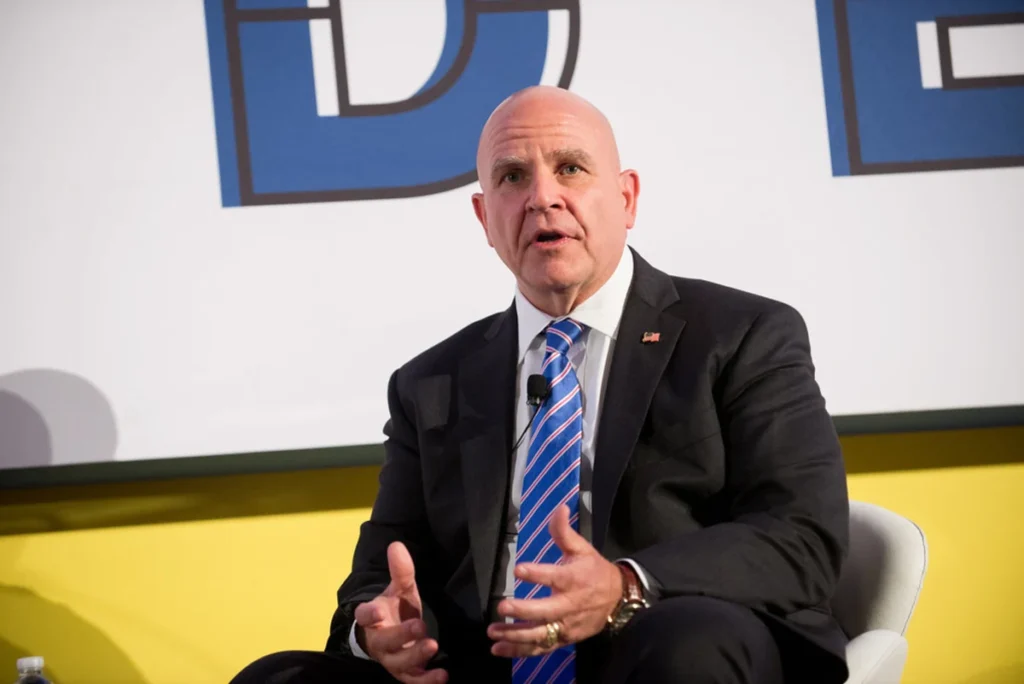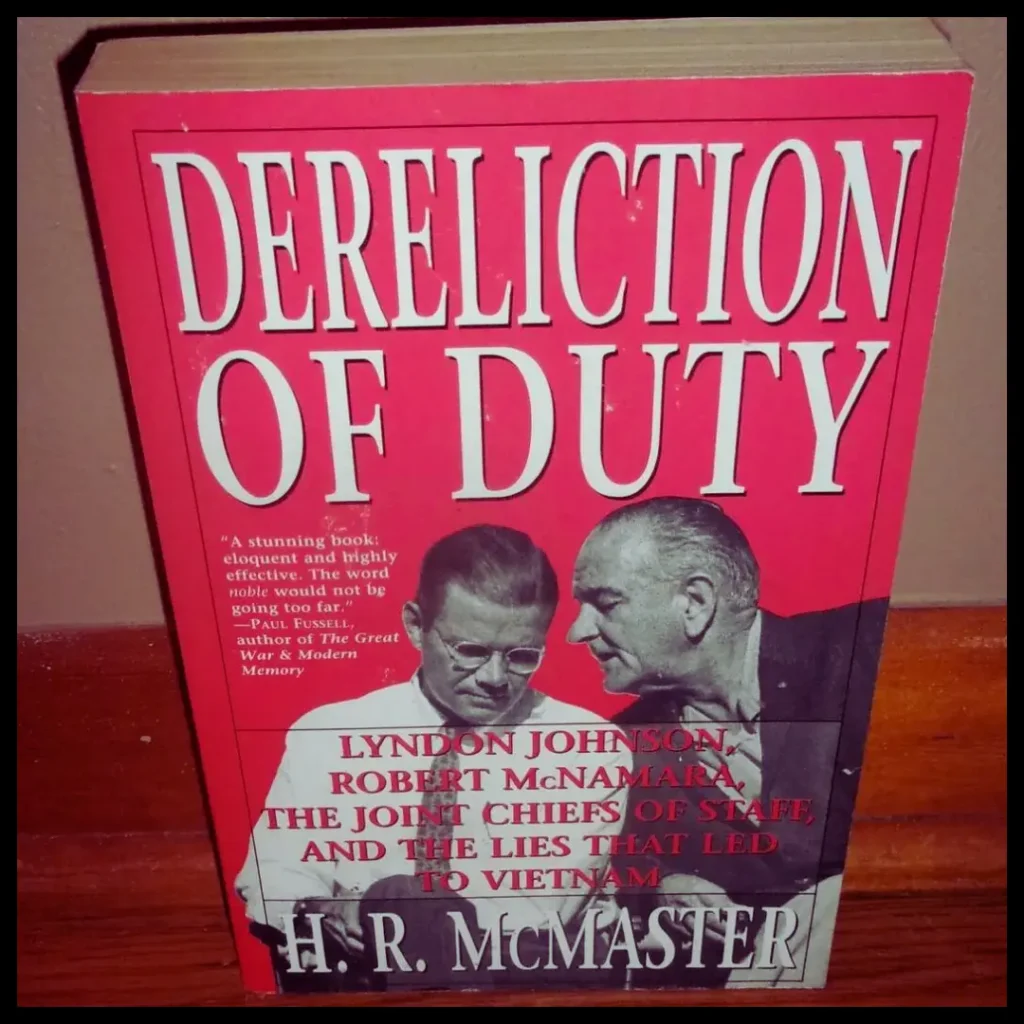H.R. McMaster on Why do Authoritarian Countries Fear the West?
Thank you for speaking to me. I’m Neil, and I’m a graduate student in history at the University of Oxford, so I’m happy that you emphasized this.
Houston is still there Emeritus, though, right?
Yeah, Hugh Strachan is still there as an Emeritus Professor.
I think he moved back to Scotland, but do you ever interact with him?
I don’t think I’ve heard his name, but I do interact with Margaret MacMillan, who you mentioned in your talk. I suppose my question is, with regards to this focus on changing continuity, two terms that I’m very familiar with, and also with regards to your doctrine of strategic empathy, my question is, why do totalitarian and authoritarian governments throughout history, even while aspiring to a position of great strength,
why are they often so guided by this vulnerability and this fear of the West? I mean, you see this time and time again, Stalin’s Russia at Yalta, Putin’s Russia, Xi Jinping…?
Yeah, well, I think it’s because they’re driven not as much by fear of the West as they are by fear of their own people. I believe that what drives Xi Jinping, for example, is his fear of losing the party’s exclusive grip on power. I think that’s how you can understand his behavior better than any other factor. So, for example, does it make sense for Xi Jinping to double down on state-owned enterprises when it’s the companies that have more private sector characteristics that are growing the economy much more?
Of course not. Does it make sense for him to engage in a zero-COVID policy that is tubing his economy right now?
H.R. McMaster 2nd National Security Adviser

Answer: No, it doesn’t. But when you look at it through the lens of his obsession with control and the fear of losing control, then I think it begins to make sense. And I think you can understand the aspirations of the Party Leadership in Terms of the Narrative of national rejuvenation through that fear of losing control.
And the way that the party is now not only extending and tightening this exclusive grip on power by perfecting a technologically enabled Orwellian police state, but also the way that the party is stoking jingoistic nationalism and, I think, preparing the Chinese people for war. I think that is all related to the party’s fear of losing control.
And you see this in some of the recent speeches that he’s made where he’s been extolling Mao and Mao’s decision to go to war against the “war of American aggression” in Korea. He called it a preemptive war. He said that Mao had delivered one blow to prevent a hundred.
A hundred blows against China. So, portraying China as the victim, when if you just look at the behavior of the party, the party has forced COVID on the world, suppressed any efforts to figure out the origins of COVID, persecuted anyone who tried to ring the alarm bell about it, journalists and doctors.
They had to insult to injury with this wolf warrior diplomacy that you’ve seen them engage in across the world, and then they’ve matched it with aggression in cyberspace, massive cyber attacks against our medical research facilities amid a pandemic, economic coercion against Australia and Lithuania, and then physical aggression from the Himalayan frontier to the South China Sea and the threats toward Taiwan.
So, I would just say, you know, I don’t think it’s their fear of the West. I think it’s really what’s driving them. There’s a great new book out, a relatively new book, by Frank Dikötter, who is a phenomenal scholar. For anybody interested in the history of the Chinese Communist Party, his Mao Trilogy is brilliant.
And he’s about to come out with a fourth arm. About to come out. So, I think just, you know, start, I think, in the order in which he wrote them. He has “Mao’s Great Famine” the first one, which is on the Great Leap Forward, which of course was a great leap backward, you know, and then he wrote about the Cultural Revolution, and then he went back to the origins of the party until 1949.
But the book that I think all of you would enjoy reading because it answers your question is called “How to Be a Dictator.” And these are case studies, and they’re just chapter length, easily digestible. And so, these are dictators, totalitarian regimes of the 20th century, how they stayed in power, from Mussolini to Ceaușescu, you know.
So, let’s go, should we go in the back? Let’s go, let’s go in the back to the right there, and then we’ll come up here. So, I can give you like two, do you want to do two in a row? You do that. I’ll try to be more brief here too. Okay, hear what’s on your mind.
H.R. McMaster’s Book “Dereliction of Duty”

Yeah, thank you so much. I read your book “Dereliction of Duty” a couple of years back, and it was very… I guess I didn’t realize the extent to which it seemed like Johnson’s advisors sort of almost didn’t want to look foolish in front of the president and, as you said, preserve their influence. I’m just curious if you see any parallels between that situation and the pullout from Afghanistan just kind of more broadly.
Yeah, okay, great, thank you. Take yours. Okay, so just to give you a context, I’m an affiliate of the American Grand Strategy Program at Duke. Okay.
And I wanted to ask the evil ones at Duke, you said Duke, I went to Chapel Hill, so… So it’s a devil, it’s a Blue Devil, I’m sorry, go ahead. Okay, so we study like, um, um, closer with the, uh, beginning of the Chinese thinkers like, uh, they have great things and strategy like Sun Tzu, “Art of War,” uh, the Indians have “Arthashastra.” So, do you think, like, there is an educational atrophy there because we are not moving into an eclectic direction in terms of studying strategy?
Yes, yes, yes, okay, so first of all, on Vietnam and the parallels, you know, it was a surreal kind of feeling to walk into the West Wing of the White House the day after President Trump hired me.
I didn’t even live in Washington, so I flew home, uh, packed a bag, took a lot of books with me, actually, and, uh, and then got back on Osprey aircraft, flew back to Washington, and started on a Tuesday, right?
So, he hired me on a Monday, started Tuesday afternoon, and as I walked into that office for the National Security Advisor, McGeorge Bundy’s old office, you know, I realized that now I was going to be in charge of the policy-making process that I had criticized as a historian, and, uh, and so, what the heck do you do, right?
So, I brought into the job about four or five lessons that I was going to try to apply to the process that we set up to protect against what I
Just goes back to design thinking and problem framing, right?
In Vietnam, there was a tendency toward immediately taking action and then the confusion of activity with progress, right? And not enough attention really to understand what is the real nature of the problem in South Vietnam. So, the second thing was that we would craft goals and objectives, right?
I mean, George Bundy in that time said, “Hey, it’s better not to have a goal or objective,” right?
Because that way, if we don’t accomplish our objective in Vietnam, we can say we didn’t want to do that anyway, right? So, I mean, you know, it doesn’t make sense, especially in war. And there’s a real ethical problem associated with just war theory, even right?
That having a just end in mind is one of Thomas Aquinas’s criteria for just war. The third is that we were going to identify the assumptions on which the strategy was based and test those assumptions. We already talked a lot about that. And then the fourth was that we were always going to present multiple options to the president.
And I tried to do that with everything. We brought to President Trump, was to give him multiple options because it’s in the presentation of those multiple options that you can draw out long-term costs and consequences.
And by just doing so, you can guard against groupthink, right? You can encourage people to examine those multiple options. These, by the way, these lessons are consistent as well with a history of the National Security Council and National Security Advisors from really the Truman Administration through the George W. Bush Administration, called “Presidential Command” by Peter Rodman. And it’s a very good book.
I’d recommend just even reading the final chapter of that book to get his perspective. So, you know, I did try to guard against groupthink. And then, of course, you know, one of the reasons I was only there for a little bit over a year was I did always tell the president what he didn’t want to hear, you know? And I think it would have been a disservice to him to do anything else, you know? So, um, I mean, that can get you in that kind of competitive environment in a White House where people have different agendas, that can, you know, that can diminish you over time, diminish your influence over time.
But I was at peace with that, right? Everybody with President Trump has a shelf life, you know? And, uh, and it was my job to give him the best advice I could, and I owed it to him, and I owed it to the country, and the Constitution, and everything else. So, um, I think in any White House, there are three types of people, I think, that serve in any White House, or maybe even broadly, administration. The first are those who are civil servants, right?
Military officers, intelligence professionals, diplomats, and political appointees, but people who are motivated mainly by giving the president options, giving the president the best analysis and advice and multiple options, and letting the president decide his or her policies, right?
I mean, because recognizing that, hey, nobody elected them, right? The president got elected. There’s a second group of people, I think, in any administration who are there to advance their agenda, not the president’s agenda. Maybe they have an agenda on immigration or they have an agenda on trade or something, right?
But they’re gonna advance that agenda while they’re serving, you know? But they’re serving their agenda, not the president’s. And then the third group of people are people who maybe define themselves in the role of saving the country and maybe the world from the president, right? Now, I mean, the problem with that second or third group of people, again, is nobody elected them, right? And so, they don’t understand the role that has been assigned to them, to use kind of stoic philosophy a little bit there.
So, I think that it’s important to understand your role and to serve, you know, any president or elected leader that way. And then, in terms of whether are we neglecting the study of war and warfare across a broader time and with different cultural and historical perspectives, yes, I think that is a deficiency.
There’s a great book by a great professor at the University of North Carolina, Chapel Hill, Wayne Lee, called “The History of Warfare,” in which he does a phenomenal job at looking at the history of warfare, how war is conducted across a broad scope of history, from ancient times to the present, and from a variety of geographic and cultural perspectives. I highly, highly recommend it. Great book. I mean, I can’t believe you pulled it off. It’s a phenomenal book.
Alright, let’s go. I’m going to go back, back here, and then front again. We’ll take two in a row again. Great.
What Do You Make of The 2019 Cigar Report?
Hi, I’m Dale. I’m an undergraduate at Stanford and also an army veteran.
Two questions that I wanted to ask:
Are hands in pockets an officer thing?
The second question is: what do you make of the 2019 cigar report that came out on Afghanistan that revealed what policymakers knew, the progress they weren’t making, and how people in the chain of command also didn’t know what they were doing?
Answer: Okay, yeah, if it was a general thing, it’d be like this, right? Bowling, like that. So, okay, and your question, go ahead.
Question: Are Hands in Pockets an Officer Thing?
Answer: The practice of putting hands in pockets can vary among individuals and cultures. In some military traditions, it may be considered unprofessional or disrespectful for officers to have their hands in their pockets while on duty. However, this can also depend on the context and the specific customs of a particular military organization.
How Do You Craft An Assumption?

question: Thank you. I’m a final-year undergraduate in Mexico, and I wanted to know how you craft an assumption. Because what I understood from the lecture is that you do it by understanding past behavior.
But what happens when you do not know what has happened in the past?
You have no past behavior. Thank you.
Okay, great, great questions. So, the cigar report, okay, so this is the cigar report that would come out pretty much annually. The issue I had with the cigar report is I think it was just a defeatist effort from the beginning. I think that there were no recommendations in those reports over many years about what the heck can we do about it, you know? I mean, do we make aid more conditional?
This deals with the problem of corruption to organized crime in Afghanistan, which is related to the political settlement that emerged in Afghanistan after 2001. And I think not viewing that problem through the political lens was a real problem in cigars and limited maybe the utility.
When Crafting an Assumption and You Don’t Have Past Behavior to Rely on, You can Use Several Strategies.
- Analogous Situations: Look for similar situations or contexts where past behavior is known. You can draw parallels and make assumptions based on how similar situations played out.
- Expert Opinions: Consult experts in the field who may have insights or theories based on their knowledge and experience.
- Scenario Planning: Success in different scenarios based on different assumptions. This helps in preparing for a range of possibilities, even if the exact past behavior is unknown.
- Contingency Planning: Develop plans that are flexible and can adapt to different outcomes, considering the uncertainty of the situation.
- Use of Models: Utilize analytical models that can simulate different scenarios based on various assumptions, helping you understand the potential outcomes of each scenario.
By using these approaches, you can craft assumptions even when past behavior is unknown, helping you make informed decisions based on the available information and analysis.
Question: How do you Guard Against Groupthink in the Policy-Making Process?
Answer: Guarding against groupthink involves several strategies. One is to encourage diverse perspectives and dissenting opinions within the decision-making process. This can be achieved by creating a culture where challenging assumptions and presenting alternative viewpoints are welcomed.
Additionally, seeking input from outside experts or stakeholders who may offer different insights can help avoid groupthink. Another approach is to conduct thorough analyses of proposed policies, including considering potential unintended consequences and alternative courses of action. Finally, fostering an environment where individuals feel empowered to voice their opinions without fear of reprisal is key to mitigating groupthink.
Is there an educational atrophy in studying strategy by focusing only on certain thinkers and cultures?
Answer: Yes, there may be an educational atrophy in studying strategy if the focus is too narrow, neglecting the insights from diverse historical and cultural perspectives. For example, while Western thinkers like Clausewitz are often studied, there is valuable strategic wisdom in works like Sun Tzu’s “The Art of War” or the Indian “Arthashastra.” Broadening the scope of the study to include a variety of perspectives can enhance strategic empathy and provide a more comprehensive understanding of warfare and strategy.
FAQs:
- Who’s H.R. McMaster?
H.R. McMaster, full name Herbert Raymond McMaster, is a sheltered United States Army Lieutenant General and former National Security Advisor. He’s also a military annalist and author.
- What is H.R. McMaster known for?
H.R. McMaster is known for his military service, particularly his leadership during the Gulf War, Operation Enduring Freedom, and Operation Iraqi Freedom. He’s also known for his strategic thinking and his book” Dereliction of Duty,” which reviews the military leadership during the Vietnam War.
- What’s H.R. McMaster’s background?
H.R. McMaster was born on July 24, 1962, in Philadelphia city Pennsylvania. He graduated from the United States Military Academy at West Point in 1984 and later earned a Ph.D. in military history from the University of North Carolina at Tabernacle Hill.
- What’s H.R. McMaster’s military career like?
H.R. McMaster served in a variety of command and staff positions in the U.S. Army, including as a commander in the Gulf War, an elderly counsel to the commander of U.S. Central Command, and a commander in Afghanistan. He retired from the service in 2018.
- What’s H.R. McMaster’s part as National Security Advisor?
H.R. McMaster served as the National Security Advisor to President Donald Trump from February 2017 to April 2018. During his term, he was known for championing a tough station on Russia and China and for his sweats to reorganize the National Security Council.
- What’s H.R. McMaster doing now?
Since leaving the service and his part as National Security Advisor, H.R. McMaster has returned to tutoring and jotting. He’s an elderly fellow at the Hoover Institution and a speaker at Stanford University’s Graduate School of Business.
- What awards and honors have H.R. McMaster entered?
H.R. McMaster has received multitudinous awards and honors for his military service, including the Silver Star, the Citation Star Medal with the” V” device, and the Purple Heart. He’s also a member of the Council on Foreign Relations.
- What’s H.R. McMaster’s approach to leadership?
H.R. McMaster is known for his strategic thinking, emphasis on professional military education, and concentration on clear communication. He believes in empowering inferiors and encouraging innovative thinking within the service.
- Has H.R. McMaster written any books?
Yes, H.R. McMaster is the author of many books, including” Dereliction of Duty Lyndon Johnson, Robert McNamara, the Joint Chiefs of Staff, and the Falsehoods That Led to Vietnam,” which is a notice of the military leadership during the Vietnam War.
- How has H.R. McMaster contributed to military strategy and policy?
H.R. McMaster has been influential in shaping military strategy and policy through his jottings, training, and service. He’s known for his moxie in counterinsurgency and has been a commanding voice in the development of U.S. military strategy in Iraq and Afghanistan.
- What’s H.R. McMaster’s educational background?
H.R. McMaster earned a Bachelorette of Science degree from the United States Military Academy at West Point in 1984. He later earned a Master of trades and Ph.D. in military history from the University of North Carolina at Tabernacle Hill.
- Is H.R. McMaster involved in any charitable or humanitarian conditioning?
H.R. McMaster has been involved in colorful charitable and humanitarian conditioning supporting stagers and military families. He’s also a member of several associations devoted to supporting the military community.
MORE ABOUT: Chief of Staff John Kelly
